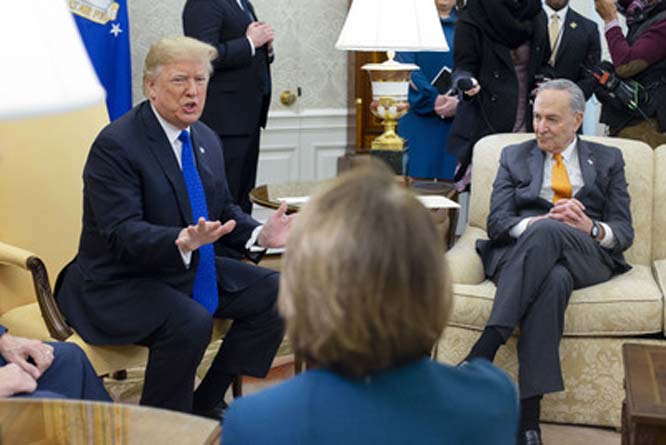 Abaca Press
Abaca Press
The capitol provides ongoing examples. Think Brett Kavanaugh's Supreme Court confirmation hearings. But let's take that pathetic Oval Office meeting the other day among President Donald Trump, presumptive House Speaker Nancy Pelosi and Senate Minority Leader Chuck Schumer. Ostensibly, it was designed to work on a compromise to fund the government and avoid a partial government shutdown when spending authority runs out this month.
The session started out civilly enough with Trump thanking the Democratic congressional leaders for coming. He hailed their bipartisan successes with the massive Farm Bill and once-unachievable criminal justice reforms, now on the precipice of passage.
The president's speaking style is to stress the importance of something by repeating it. So he went over all this several times. Then, of course, he felt compelled to bring up the border wall with Mexico before inviting Pelosi to say a few words.
"I think," said the 78-year-old returning speaker, "the American people recognize that we must keep government open, that a shutdown is not worth anything, and that you should not have a Trump shutdown …"
Trump interrupted. "Did you say ‘Trump'? Oh-oh."
Pelosi repeated: "A Trump shutdown."
Trump came back: "I was going to call it a Pelosi shutdown."
The "negotiations" went downhill from there for 18 minutes before it was time for a commercial break in the real-life reality show.
From a TV point of view, the arguing, interrupting, counterpunching, talking over each other and pleading to the cameras was delicious viewing, lacking only tears to make the moment picture perfect.
It had nothing to do with governing or solving fiscal and political problems. It had everything to do with theatrical talking points and our ongoing bipartisan partisan dysfunction.
The media feigned shock at the scene, predictably pronouncing Democrats the clear winners because Trump claimed proud ownership of any shutdown.
As executive producer of the Oval Office show, Trump says he did so because the border wall-funding fight concerns "national security."
Both sides were playing to their bases, who cheered. The rest of us can go to hell.
Pelosi, who desperately wants to become the first returning speaker in six decades, needs party support and caucus votes for the full House balloting Jan. 3.
Her poll numbers are worse than Trump's. What better way to bolster them than to bait and talk back to her former campaign donor, the man who should never have beaten Democrats' awful candidate in 2016?
Trump had to know the coastal Democratic duo of Schumer and Pelosi was not going to cave before all the cameras. He so wants to broker a deal while showing his 44 percent that he continues the fight against illegal immigration and the fetid swamp's modus operandi that ignores the concerns of everyday Americans. Coincidentally, by shouldering a shutdown's responsibility, he eased the load on congressional Republicans.
The disappointing display of juvenile behavior got everyone through a few more news cycles of he said, she said — and it heightened attention for this week's episode. But it did absolutely nothing to address the genuine concerns of both sides.
Now, "me first" is not a new phenomenon in Washington, Chicago or elsewhere. Somehow, our nation's capital and all who inhabit and play there have become stunningly shortsighted.
Their job responsibilities used to include annual budgets and appropriations. Now they're almost giddy to craft them for two months — or weeks.
Veteran pols used to expect political judgment on their good work at the next election. Today, the instant priorities, distortions and verdicts of social media bring crippling pronouncments on this morning's expedient talking points within the hour. Debilitating hashtags like #Hypocrite and #Traitor often make long-term planning too expensive.
The legacy news media grew fat and cocky in their now-deceased monopolies. Their perceived arrogance and bias, fueled by heated cable news arguments, make the once-normal reporting effort of seeking reactions seem more like fomenting turmoil to lure viewers and online clicks.
So, what to do? In an oblique way, news consumers can vote on news media with their remote controls, mouse clicks and subscription dollars.
And they can impose verdicts on members of Congress. A favorite meme is term limits. That's a great topic for high-school debate class. But it's not going to happen with a constitutional amendment that needs ratification by 38 states.
Here's a radical, perhaps utopian thought: What if instead of conveniently calling on others to do something, savvy voters took control themselves? What if individually, one by one, we took responsibility to pay better attention between elections and imposed our own term limits on those who respond or behave poorly?
Currently, 80 to 90 percent of Congress gets re-elected. For those members, the message is clear: "People bitch and moan about all sorts of stuff, but in the end they come back to me."
What if we didn't?
(COMMENT, BELOW.)
Andrew Malcolm
McClatchy Washington Bureau
(TNS)
Malcolm is an author and veteran national and foreign correspondent covering politics since the 1960s.


 Contact The Editor
Contact The Editor
 Articles By This Author
Articles By This Author